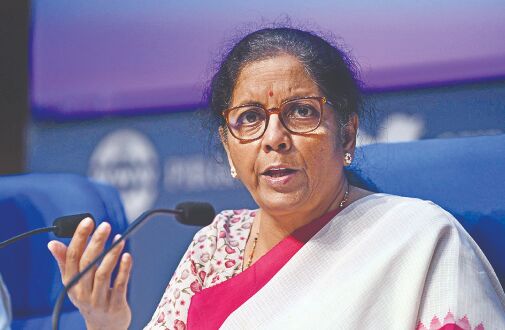Dept of Public Enterprises to decide fate of central PSUs in non-strategic sectors

New Delhi: In a bold attempt to revive India's disinvestment agenda, Union Finance minister Nirmala Sitharaman has roped in Department of Public Enterprises (DPE) to decide the fate of central Public Sector Undertakings in non-strategic sectors, leaving Department of Investment & Asset Management (DIPAM) to handle their sale process.
A month after initiating the DPE into her ministry, Sitharaman apportioned to the DPE all non-strategic PSUs and handed it powers to finalise whether they were ripe for a sell-off or a shut-down, leaving the decision on PSUs toiling in strategic sectors with the DIPAM.
An office memorandum from Finance Secretary's Coordination Cell says that "DIPAM shall continue to handle all matters relating to the New Public Enterprise Policy in respect of public enterprises in strategic sectors".
"DPE shall hereafter be responsible for reaching in-principal decisions in respect of public enterprises in non-strategic sectors regarding their privatisation or closure," says the August 17 order.
It makes DPE the single agency to decide the fate of a non-strategic PSE with "appropriate consultations with other ministries and institutions, as deemed necessary".
Subsequently, DPE would seek the approval of the Cabinet Committee on Economic Affairs (CCEA) for the privatisation of the PSU or its closure, without the option of merging it into another Central government enterprise.
If the CCEA decides to opt for privatisation, the PSU would be referred to the DIPAM for conducting the strategic disinvestment. "The timing of specific transactions shall be decided by DIPAM taking all relevant factors into account."
In case the CCEA prefers to close a PSU, the latter would be referred to the DPE's domain for "further necessary action".
The DPE was brought into the Finance Ministry's fold on July 6 this year, removing it from the ambit of the Ministry of Heavy Industries & Public Enterprises.
Sitharaman has also given the DPE the additional responsibility to handle asset monetisation of PSUs (strategic and non-strategic) identified for disinvestment. However, this work would be formally transferred to the DPE after a Cabinet approval.
"Work relating to asset monetisation or land monetisation and administrative control of the proposed new Special Purpose Vehicle for land monetisation shall in principle be handled by the DPE. However, the activity shall remain with the DIPAM until the Cabinet approval for formation of the land SPV is obtained," says another Office Memorandum.
"As soon as Cabinet approval is obtained, the above activity shall be transferred to the DPE for which orders will be issued separately," says the second OM issued by the Finance Secretary's Coordination Cell on the same day.
The demarcation of responsibilities between DIPAM and DPE and the streamlining of procedures have been done to "enable efficient conduct of Government business" as there were certain commonalities and overlap in the business allocation between the two, with DIPAM struggling with the extra burden.
The Narendra Modi government in February issued the NPEP which identifies four broad areas — national security, critical infrastructure, energy and minerals and financial services — to demarcate between the strategic and non-strategic sectors. Based on these classifications, the strategic sector includes — atomic energy, space and defence; transport and telecommunications; power, petroleum, coal, and other minerals; and banking, insurance and financial services — where bare minimum PSUs would be retained.
The remaining PSUs in strategic sectors would be privatised, closed, or merged, or made a subsidiary of another PSU. DPE's inclusion in July was an indication of the Modi government's desire to expedite and facilitate privatisation while ensuring a smooth transition of PSUs from state-run entities to private companies.
Given DPE's expertise in counselling, training, and rehabilitation of employees seeking voluntary retirement as well as rendering advice related to revival, restructuring, or closure of PSEs, it is also expected to iron out post-privatisation complications, in conjunction with DIPAM.
DPE, in its earlier avatar as the Bureau of Public Enterprises in 1965 was with the Ministry of Finance. In September 1985, BPE was made part of the Ministry of Industry because PSUs were considered the prime movers of economic development. In May 1990, it was upgraded to the Department of Public Enterprises.



